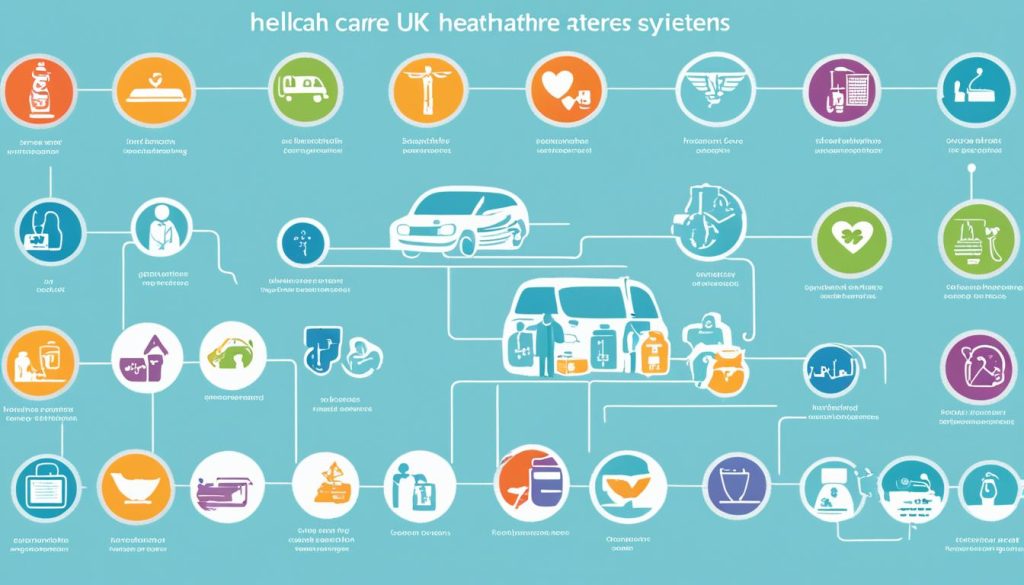The National Health Service (NHS) is a key part of UK health services. Since 1948, it has been a model of public healthcare excellence. It was started with the dream that everyone in Britain should get medical care based on their health needs, not their wealth. The NHS believes that everyone has the right to healthcare.
The NHS’s main goal is to provide full services to everyone in the UK. It ensures that nobody misses out on health and well-being. It’s free when you use it and paid for by taxes. This shows the country’s commitment to a strong public healthcare system for all future generations.
The Formation of the National Health Service (NHS)

After World War II, Britain entered a new era with the start of the NHS. The launch of the National Health Service was a big step towards giving everyone access to healthcare. This change was huge for how healthcare was given and became a key part of British life.
Origins of the NHS
The NHS vowed to give all citizens free healthcare, no matter their wealth. Before the NHS, only the wealthy or lucky ones getting charity could afford medical care. The NHS introduced a system where everyone could get the care they needed, making healthcare available for all in Britain.
Principles of Universal Healthcare
The NHS’s main idea was to offer free healthcare services, paid for by taxes. This move towards universal care was a model for the world, showing a new way to do healthcare in Britain. It divided responsibilities across hospitals, primary care, and community services, making sure everyone in the UK had access.
As the world changed, the NHS changed too, always trying to meet public health needs. NHS Trusts were created to improve services, focusing on quality, efficiency, and putting patients first. This evolution shows the NHS’s lasting mission to treat everyone with respect and dignity.
Structuring of the NHS: A System for All
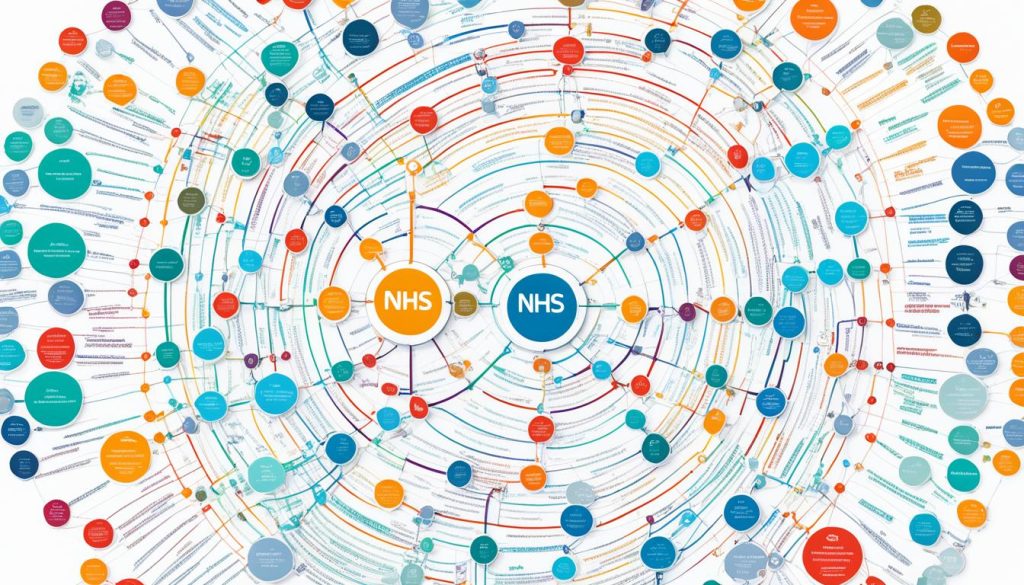
The NHS structure is a complex healthcare organisation. It’s carefully crafted to meet different health needs. Stakeholder engagement is crucial here. It makes sure healthcare is in line with community needs. Let’s explore the key parts of this detailed healthcare model.
-
Providing Care: Service providers are the NHS’s heart. They include hospitals, GP surgeries, and mental health services. Their mission is to give non-stop care and support to patients.
-
Commissioning Care: Behind the scenes, Clinical Commissioning Groups (CCGs) play a key role. They look at local needs and get services in a smart way.
-
Safeguarding Patients: To keep healthcare safe and high-quality, the Care Quality Commission (CQC) is vital. They ensure patients receive the best care possible.
-
Empowering People and Communities: HealthWatch England shows the NHS’s dedication to engaging with people. It gives a voice to the community.
The Secretary of State for Health and the Department of Health guide the system. Local governments add a personalised touch to community health. This full structure makes sure services are easy to get, fair, and quick to react. It’s truly a healthcare system made for everyone.
NHS Funding: How It Is Sustained

The National Health Service (NHS) is a vital part of British healthcare, funded mainly by taxes. This method means everyone pays into a common fund through their taxes. A big part of public spending goes into keeping the NHS running smoothly, with finances critical to its everyday activities.
- About 18% of a UK citizen’s income tax goes to healthcare. This shows the country’s dedication to health for all, no matter their wealth.
- This means nearly 4.5% of the average income helps fund national health. It shows personal contributions to communal health.
- All these payments add up to about 8.4% of the UK’s GDP spent on health services. It underlines health as a national priority.
The NHS gets the most funding in the healthcare sector from public sources. But, there is also a private sector. It’s smaller but offers more choices for health services. Still, it’s the strong funding for the NHS that shows the UK’s promise for healthcare open to everyone.
Primary Care: The Frontline of British Healthcare
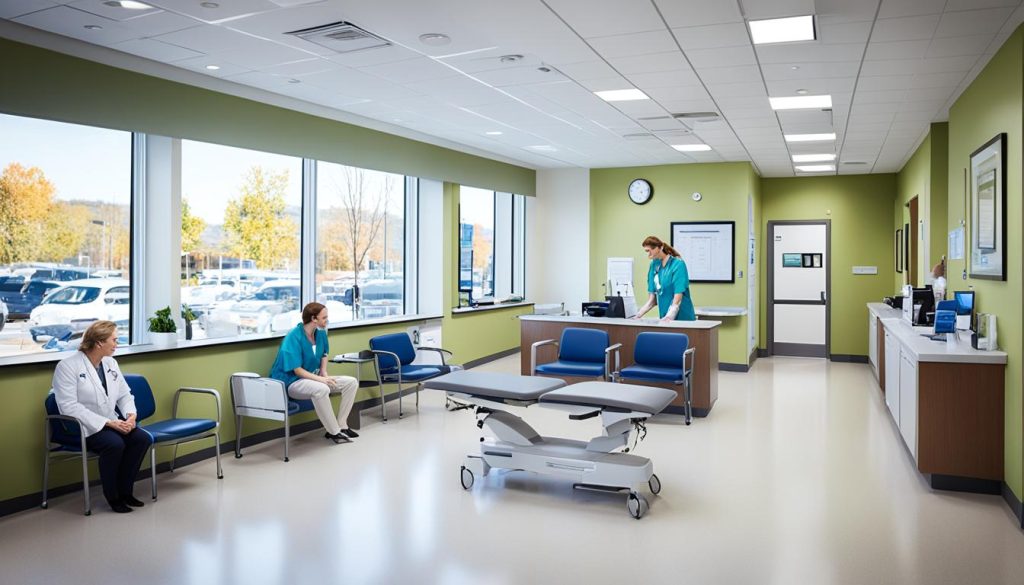
Primary care services are the heart of the UK’s health system. They are a team who looks after the community’s health every day. They do more than just meet you first; they mix convenience with full care. This makes them a key part of health in the UK.
General Practitioners (GPs) Role
GPs are vital to the NHS because of their dedication to patient care. They help patients navigate the NHS and give crucial advice, diagnoses, and treatments. Working in over 8,300 practices, GPs handle many tasks. They provide care for all kinds of illnesses and also work to prevent them. They show how varied primary healthcare can be.
Dentists, Opticians, and Pharmacists
NHS dental care is important for treatment and prevention. British dentists ensure our oral health is good, which helps our overall health.
Opticians keep our eyes healthy, detecting problems that might show other health issues. Pharmacists are key in advising on medicines and health. They help with minor issues, possibly stopping the need for GP or hospital visits.
Together, GPs, dentists, opticians, and pharmacists make primary care work well. This team approach means health problems are sorted out quickly and well. It reduces the strain on hospitals and helps make a healthier community. This reflects the NHS’s values.
Evolving British Healthcare: From Hospitals to Home

The UK’s healthcare system is changing fast. More focus is now on home-based treatments and community care. This big change aims to improve people’s lives through better NHS services, away from hospitals.
Community-Based Care Initiatives
Community healthcare is growing everywhere in the UK. These efforts make sure people get care where they feel most at home. The aim is to make healthcare a seamless part of daily life.
- Increased funding and support for local clinics and health centres
- Integrated care pathways that dovetail with social services
- Enhancement of telehealth services and remote care
- Outreach programmes targeting vulnerable communities
Hospital Care versus Home Care
Hospitals remain vital for serious health issues in the UK. But, the NHS is trying hard to treat people at home when possible. This approach turns home into the main place for getting better, with full support from health workers.
- Development of at-home monitoring systems for chronic disease management
- Expansion of home visitation by healthcare professionals
- Transition of post-operative care from hospital wards to home environments
- Utilisation of home-based rehabilitation programmes
The aim is clear yet challenging. It’s to keep patient care high through the NHS, while embracing the advantages of home treatment.
Navigating Care Options: Patients’ Rights and Choices
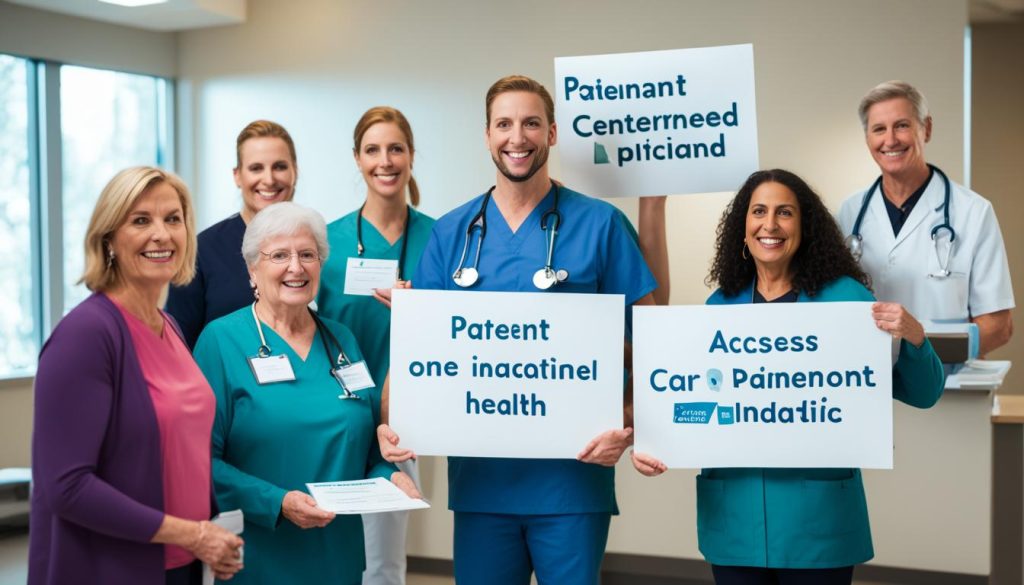
It’s key to know your healthcare rights to make good choices for your treatment. The NHS Constitution backs the idea of patient choice NHS. It lets people in the NHS system look at different treatment options the UK offers. This shows how serious the UK is about healthcare rights and patient empowerment.
Having the power to choose your healthcare provider is a big deal. It helps you control your health journey. The NHS gives you info to choose from many healthcare services. This choice includes both the provider of specialist services and the treatment type, fitting individual healthcare wishes.
- Freedom to choose your general practitioner (GP)
- Selection of healthcare facility for specialist treatment
- Access to a preferred consultant-led team
- Opportunity to consider various treatment types
- Option to partake in NHS or approved private services
Having choices is just the first step. Next is using your power. The NHS wants patients to join in their care decisions. Knowing your condition well and all your options is important for this to work.
The link between patient choice NHS and healthcare rights means acting for your health. Talking with doctors, asking questions, and looking at all the treatment options UK offers is key. It’s more than your right; it’s needed for the best health results.
- Make your preferences known
- Consider second opinions
- Stay updated on new treatment developments
- Take charge of your long-term care plan
With the right info and support, you can look through what the NHS offers. This leads to care that fits you better and makes you happier with your health care. The NHS Constitution isn’t just a piece of paper. It’s a real promise to help everyone on their healthcare journey with patient choice, rights, and empowerment.
Commissioning and Purchasing of NHS Services

The National Health Service (NHS) focuses on fair access and smart buying of healthcare. Its commissioning process makes sure we identify and meet the public’s health needs within budget limits. This careful planning and decision-making helps shape our healthcare future.
The Role of Clinical Commissioning Groups
Clinical Commissioning Groups (CCGs) lead the way in NHS commissioning. They focus on their local healthcare needs. Made up of GPs and health pros, they manage resources to offer high-quality and cost-efficient services. They know their local patients well, so they can tailor services to meet real community needs.
Allocating Resources for Quality Care
CCGs balance the books while meeting health needs. They use their deep knowledge to spend wisely, ensuring we get value for money. By focusing on results for patients, the NHS commits to top-notch public health services.
- The sustainability and efficiency of services.
- Improvements in health outcomes for the population.
- Reducing inequalities in access to healthcare.
- Engagement with service users and the public in health-related decisions.
NHS commissioning and managing resources are vital for a trusty, quick-to-respond health system. It aims for high-quality care for everyone in the UK.
Striving for Quality: Measuring Outcomes
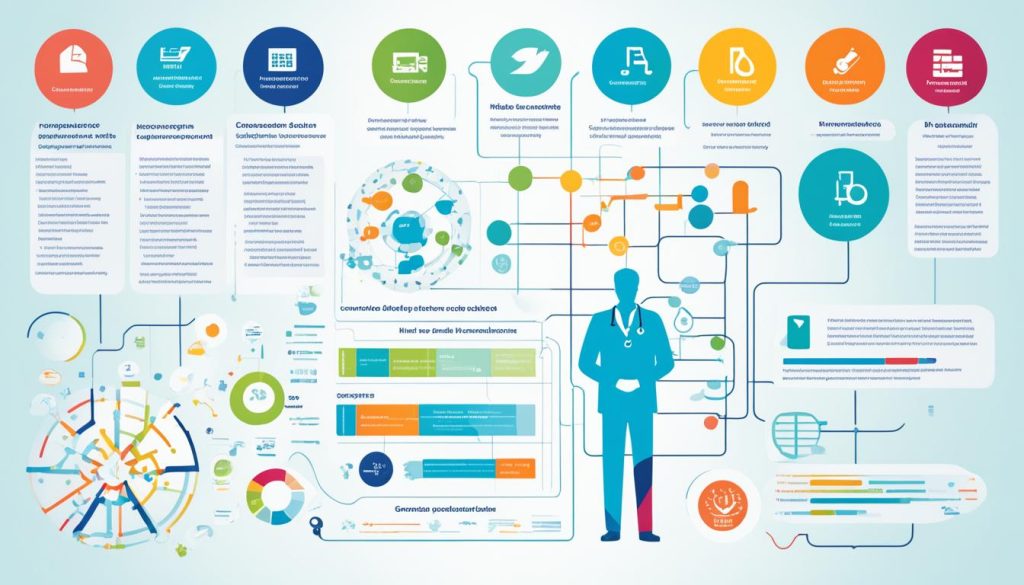
The National Health Service (NHS) focuses on delivering healthcare and improving healthcare outcomes. It constantly improves its services based on patient results. Understanding and improving healthcare delivery is made possible by measuring quality within the NHS.
Understanding ‘Outcomes’ in Healthcare
NHS experts aim to look beyond just doing procedures. They focus on measuring the real results of medical treatments. This approach lets them see the true impact of care, measuring health gains accurately.
Patient Perspective: Enhancing Service Quality
The NHS values patient experiences highly. Good service quality leads to happier patients. By focusing on what patients need, the NHS shapes its services to make them better, aiming for top-notch care.
This approach helps create a health system that listens and reacts to patient feedback. Every interaction with healthcare providers helps make services better.
- Measuring patient-reported outcome measures (PROMs) to understand the effectiveness of care from the patient’s viewpoint.
- Using patient feedback to identify areas for service improvement in UK health facilities, ensuring responsiveness to patient needs.
- Implementing enhanced recovery pathways to reduce recovery time and improve long-term health outcomes.
The NHS always puts patients first, aiming to go beyond just meeting needs. It wants to ensure patients are truly satisfied, using well-being and satisfaction as success measures.
The Development of Healthcare Legislation

NHS legislation constantly changes, shaping UK healthcare reforms. This evolution allows the NHS to meet society’s needs while staying true to its founding principles. Over time, various Acts have significantly influenced British healthcare and how it’s managed.
Key Acts and Reforms
Legislation has evolved from the National Insurance Act in 1911 to recent laws. The National Health Service and Community Care Act in 1990 introduced independent Trusts. This move brought more control over hospital care. These changes have made the healthcare system more adaptable, focusing on patient care and efficiency.
Influence of Legislation on NHS Evolution
Recent NHS reforms aim to decentralise healthcare regulation. This strategy empowers local authorities and healthcare workers. It leads to better healthcare services that focus on patient needs and satisfaction.
As British healthcare evolves, legislation and reforms play a key role in the NHS’s strength and flexibility. These measures, from major Acts to detailed policy development, weave a rich history with modernity. They ensure NHS care is both timeless and forward-looking.
Specialised Services within the British Healthcare System
The NHS offers various specialised services across the UK. It focuses on providing advanced treatment options. These services cover everything from new research to the care of rare diseases.
NHS specialised services aim to help patients and medical experts. They offer access to high-quality care in areas that need a lot of resources and know-how. These services are found in specific centres, designed to give patients the best care for their unique conditions.
- Holistic management for rare or genetic conditions
- Provision of advanced cancer care and precision oncology
- Specialised paediatric care for complex childhood illnesses
- Highly specialised cardiovascular, neurological, and transplant services
The NHS uses an integrated approach to provide advanced medical treatments. Specialised doctors and centres work together to offer cutting-edge care. This keeps the NHS at the forefront of medical care in the UK.
The NHS is always improving its specialised services. This shows the UK’s dedication to top-notch patient care. By focusing on specific health needs, the NHS proves its commitment to serving everyone with high-quality healthcare.
Comparing International Healthcare Systems with British Healthcare
When we look at global healthcare, the UK’s system stands out. It is known for the NHS’s efficiency and its goal to provide healthcare to everyone in the UK. Studies, like those from the Commonwealth Fund, show how the UK compares to other countries. They look at healthcare quality and help improve UK policies to keep the NHS top-notch.
Efficiency and Performance
The UK’s NHS is often a model of efficiency in global healthcare. It makes sure healthcare is reachable for all and doesn’t break the bank. Studies note the NHS’s smart spending and low admin costs. This shows the UK’s success in offering quality healthcare without spending too much money.
Equity and Access to Care
Equal access to healthcare is key in the NHS, meaning everyone in the UK should get care when they need it. This is important for making sure all people, especially the less fortunate, get good healthcare. However, there’s work being done to make wait times for certain treatments shorter. The goal is to always improve how quickly and fairly healthcare is given to everyone.
Rural vs Urban Healthcare Disparities in the UK
In the UK, there’s a big gap between rural healthcare UK and urban medical services. This leads to health inequalities. People living in different areas face different health challenges. Though countryside living might seem healthier, regional health disparities show it’s not that simple.
Folks in rural spots often enjoy natural beauty and peace. They might live longer if they have money. But that hides the real issue. For those less wealthy, getting to a doctor can be hard. Things like no buses make it worse for them.
Many rural homes are far from hospitals. This means long waits and far travels for any medical need. Poverty hides in these pretty places too, making it hard to get healthcare. Different people in rural areas face different health challenges.
In cities, though, there are more doctors and hospitals. This helps reduce waiting times. But, cities still face health challenges. Some parts of cities are as disadvantaged as rural areas.
- The NHS hasn’t found a way to fairly include rural needs yet. So, healthcare varies a lot across places.
- We need plans that help both rural and urban areas. This will help everyone get better healthcare.
- It’s vital to understand and fix these healthcare gaps. Doing so will make health better for all in the UK.
Conclusion
The NHS stands as a shining example of British healthcare. It embodies equality and quality in its services. It provides widespread access to medical care, free when needed.
The NHS is ready for future changes. It is evolving to be more patient-focused and efficient. Legislative changes are shaping a system ready for modern challenges. This ensures care stays seamless between hospital and community.
We have seen key changes in the UK’s healthcare system. While not always obvious, these changes keep the NHS up-to-date. This helps the NHS continue to offer top care to everyone.

